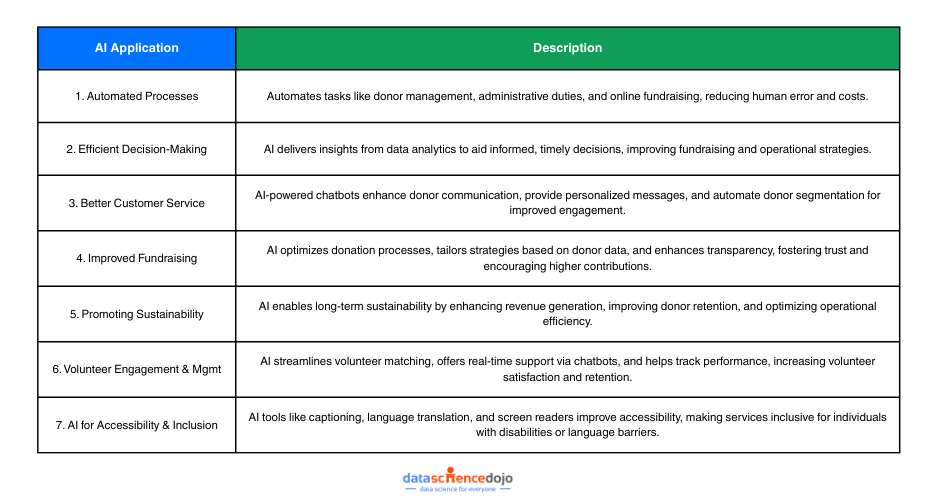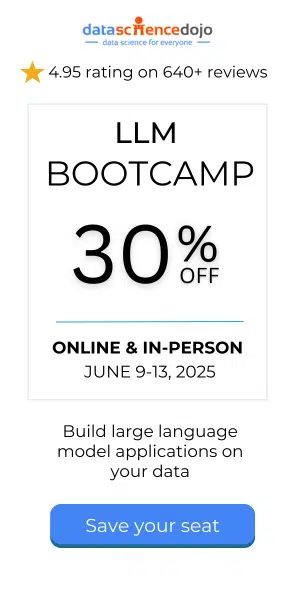The world keeps revolving around technology, and there is hardly any area or activity that has not been imparted. However, one technological intervention that is attracting our attention today is artificial intelligence (AI), which is now being adopted by non-profits for their activities.
It is quite easier to carry out data-driven operations with this particular technology. AI definitely holds so many benefits and promises, and non-profit organizations looking to steal a march on their rivals shouldn’t hesitate to implement it.
We have only scratched the surface with this introductory text. You should take some minutes to read on and discover what AI has for you as a non-profit executive.
1. Automated Processes
Non-profits will find it pretty easy to automate specific processes after integrating AI. This happens as the system is trained to identify certain data patterns. Hence, most of the tasks you regularly carry out can be satisfactorily automated. You can employ AI for administrative duties, donor management, or workflow. Again, AI can help when learning online fundraising courses, as there are resources that can be used to transcribe the sessions automatically.
From the foregoing, it is evident that AI comes in different dimensions and can bring great gains to your non-profit in various ways. For one, with automation, the execution of processes can be sped up and free from human errors – which could arise when making entries manually.
Additionally, you can derive some cost-reduction benefits from this, especially as you won’t have to consistently expend human resources on repetitive tasks.
2. Efficient Decision-Making Framework
Decisions have sometimes been the difference maker for non-profits – some being positive while others may not be so pleasant. Why is this so [you may probe]? Without trying to undermine the significance of experience, there are specific resources and tools employed by top industry leaders to help them gain a competitive edge. As a result, they can make informed and valuable decisions to aid their operations.
You don’t need to look any further, as AI is fast becoming a highly resourceful innovation that can help you build an efficient decision-making framework at your Nonprofit organization. The algorithms built into AI to provide data or business analytics can deliver insightful details on specific aspects. As it were, you can readily get wind of some notable non-profit/fundraising trends – as they happen.
Based on this, you can create an effective fundraising plan or even refine an already-existing one. Overall, you will be able to confidently make timely decisions and get things done as quickly as possible.
Considerable efficiency will even be infused into your operations as the AI-enabled system regularly analyzes data from different units, social media, and other platforms. In the long run, such a setup can substantially supplement your organization’s knowledge base.
3. Better Customer Service
You may not be running a for-profit organization, but that doesn’t mean you can’t take a cue from the business world – where the “customer is king” phrase holds forth. The donors – whether loyal or potential – are your customers as a non-profit. It is essential that you make it seamless for them to communicate or transact (donate). This is another aspect AI can help guarantee if adequately engaged.
For example, chatbots [with AI element] can see to it that donors are promptly provided with clear responses when queries are posted by donors. This would ultimately drive donor satisfaction and increase the prospect of developing a loyal (donor) base – as you sustain a responsive communication architecture with donors.
But there is more to it – building good donor relationships. An integrated AI framework enhances the prospect of sending personalized messages to donors. You can automate – or semi-automate – the process of writing and sending out emails to donors. A well-written and impactful fundraising piece takes time, but this should be taken care of as you incorporate AI.
Relatedly, donor segmentation can be expediently actualized if you have an AI system. Through this, you can effectively get the right messages sent to donors based on certain variables. Against this backdrop, non-profits can make their operations appreciably donor-focused.
4. Improved Fundraising
AI is rapidly transforming fundraising efforts for non-profit organizations by making them more strategic, personalized, and transparent. Through automation and data analysis, AI-driven fundraising platforms can streamline donation processes, reduce transaction errors, and provide a seamless experience for both donors and organizations.
By analyzing donor behavior and historical giving patterns, AI can help nonprofits identify high-potential donors, segment audiences, and tailor communication strategies to boost engagement. For example, predictive analytics can determine the best time to reach out to a donor or suggest the most effective messaging based on their past interactions.
Additionally, AI enhances transparency by providing real-time updates on fundraising goals, campaign progress, and impact metrics. Automated dashboards and chatbots can keep donors informed throughout the process, fostering trust and encouraging continued support. When donors see the direct outcomes of their contributions, they are more likely to remain engaged and even increase their giving.
Ultimately, integrating AI into fundraising strategies enables nonprofits to maximize their resources, build stronger donor relationships, and achieve their financial goals with greater efficiency.
5. Promoting Sustainability
Non-profits looking to operate a sustainable model will benefit greatly from AI. The reason may not be unconnected to how technology – on the whole – is changing the way things are done. To stay up with top industry non-profit leaders, you have to embrace sophisticated technology like AI. Doing so will help you remain in business for a long time as you scale up effortlessly.
Buttressing the point further, you will realize from the other points that have been itemized that AI can deliver tremendous advantages to your non-profit. For instance, the possibility of increasing your revenue base is higher when donor loyalty and efficient communication frameworks are guaranteed. All these realities are feasible with a sound AI system in place for your non-profit operations.
However, despite the promises that AI holds, there remain some issues – especially as it concerns data security – that need to be adequately addressed to deliver a highly efficient (AI) framework for non-profits. That said, you should understand that experts are still working around the clock to help organizations optimize the use of AI technology.
6. Volunteer Engagement and Management
AI is revolutionizing the way non-profit organizations recruit, engage, and retain volunteers—an essential component of many charitable missions.
By leveraging intelligent algorithms, nonprofits can now go beyond manual matching and utilize data-driven insights to pair volunteers with roles that best align with their unique skills, experience, location, and availability. This targeted approach not only improves operational efficiency but also enhances the volunteer experience, leading to greater satisfaction and long-term commitment.
For example, AI can analyze historical volunteer data to predict availability trends, identify high-performing individuals, and recommend the most effective ways to engage them. Some platforms use machine learning to anticipate when a volunteer may become inactive and suggest timely re-engagement strategies, helping to reduce churn.
AI-powered chatbots add another layer of value by offering real-time support throughout the volunteer journey. These virtual assistants can assist with application processing, answer frequently asked questions, send reminders, and even deliver onboarding or training content—all without human intervention. This ensures that volunteers feel supported and informed at every step, which in turn encourages active participation and builds a sense of community.
Furthermore, advanced analytics can help nonprofit leaders track volunteer performance, identify gaps in engagement, and continuously improve volunteer programs. Through AI, nonprofits can create more inclusive, personalized, and scalable volunteer experiences that ultimately strengthen their mission delivery.
7. AI for Accessibility and Inclusion
One of the most impactful ways AI supports non-profit organizations’ missions is by improving accessibility and fostering inclusivity. AI-powered tools such as real-time captioning, speech-to-text converters, and language translation services can help bridge communication gaps, making content and services more accessible to individuals with hearing impairments or those who speak different languages.
For instance, platforms like YouTube and Zoom use AI to provide automatic subtitles, enabling nonprofits to make virtual events and educational content inclusive to a broader audience. AI translation tools like Google Translate or DeepL allow organizations to localize resources quickly, helping them reach multilingual communities without significant cost or manual effort.
Additionally, AI-integrated screen readers and image recognition tools empower individuals with visual impairments to interact with digital content more effectively. These tools interpret text, describe images, and guide users through web pages, ensuring digital inclusivity for all users.
By leveraging these technologies, nonprofits can expand their reach, ensure equal access to information and services, and uphold their commitment to diversity, equity, and inclusion. AI doesn’t just enhance accessibility—it helps create a more empathetic and connected community.
Is AI a Must for Non-Profit Organizations?
The world is increasingly tech-inclined, and it will be ‘suicidal’ for any organization that wants to keep an appreciable level of relevance to neglect something like artificial intelligence. And this even applies more to you as a non-profit operator, considering that your potential donors are in virtual spaces.
You should get into the flow to start exploring and integrating AI in your operations without delay. You won’t regret this investment as it brings exceptional and long-term value.
Written by Yashashree Victoria










